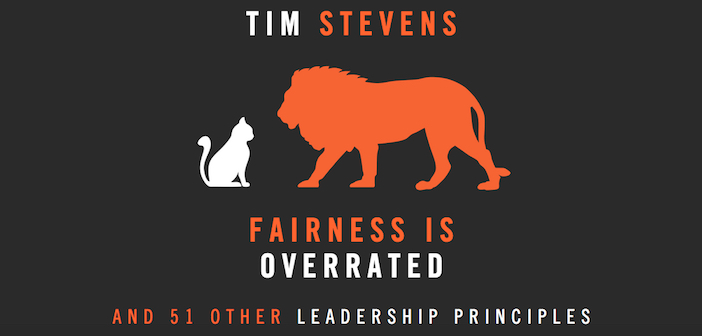I had the awesome opportunity to interview Tim Stevens about his book Fairness is Overrated earlier this month. It was one of my favorite reads in 2015, and one of the best leadership books I’ve ever read. It’s just a wealth of great information. I highly recommend you grab a copy for you and your team.
Me: In your book you talk about “Going Dark” which is about the need to disconnect from television, radio, and social media from time to time, on the flip side of that, is there ever a case where you’ve seen that pastors need to be spending more time on social media?
Tim: Sure. I know some pastors have solid reasons for not connecting on social media, and I can’t question their motives. But I do think that they miss out on a major means for communicating with their congregation and learning about what is on the mind of their guests.
Me: You talk about “Guarding Your Family” in your book, can you explain what you mean there and how pastors can do a better job of it when they feel like the ministry is demanding so much of their time?
Tim: Too many pastors treat their ministry job like a mistress—and their family gets their leftovers. No one can love our wives or kids for us. That is where ministry happens best. If your church demands more of you than is reasonable, and your family is suffering—find a different church.
Me: You talk about “Finding the Right People”, where would you tell a pastor to start who may feel like he doesn’t have anyone in the church he can turn to?
Tim: Moses had a staff in his hand. David had five smooth stones. The disciples had a few loaves of bread and some fish. In each case, God used what they already had. So start where you are. Don’t be afraid to ask volunteers to step up to a new level. Look among your existing networks. Consider partnering with a college and start an internship program. Ask someone to start in a bi-vocational role until you are able to pay him or her more. Scarcity can either breed depression or innovation. Choose innovation, and get resourceful about how to grow the church.
Me: Chapter 21 is titled “Find Leaders, Not Doers” can you explain that, and also how do you go about identifying the leaders from the doers?
Tim: If you want to fill positions and get stuff done, then look for doers to get stuff done. But if you want to grow the church, then find leaders for all the key positions in the church. Leaders are people developers—they build teams and multiply those teams over and over again. They gladly give up something they enjoy doing as they find someone else to fill that role.
Me: You say that churches shouldn’t be fair, that’s so counter to what we’ve always heard, to be unfair is to be unlike Jesus right?
Tim: I believe Jesus talked about justice. Not fairness. It wasn’t fair that he spent so much time with 12 guys more than others. And among those 12, He spent an inordinate amount of time with just 3 guys. That wasn’t fair either. We’ve read the stories of all the people who he healed. But there we likely thousands of people he walked by in the crowds who he didn’t heal. Was that fair? Jesus didn’t model fairness in his ministry. But he did model justice for those who were oppressed, poor, widowed and orphaned.
Me: Can you explain what a ministry silo is, and why are they so dangerous for a church?
Tim: Silos develop around departments when they are focused more on their departmental purpose than they are on the overall church. This is pretty common, and happens naturally without being intentional. It can really serve to tear down the church when it is full of silos. No one knows what is the priority. Families are pulled in multiple directions. To our guests, it feels competitive rather than unified. And that turns people off. Ultimately the church begins to decline.
Me: In the chapter titled, “Count the Yes Votes” you talk about the importance of focusing on those who are with you, not on those who are leaving you, why do you think it’s so hard for churches to let people go?
Tim: Because we love them! We’ve done life with them, we’ve cried with them during seasons of pain, we’ve celebrated with them through key transitions in their life. So if they begin to move a different direction than the church, or begin to disagree with the priorities of the church—it hurts to let them go. This is natural, but also crucial!
Me: You say that churches have to be as willing to stop stuff as you are to start stuff, are there any areas of ministry that you think most churches should stop?
Tim: Anything that isn’t producing the results you want. And this is very hard for churches to figure out, because most of them don’t measure results. One of the most difficult things for a church to do is to end a program that is cherished by a few, but not benefitting the many. But leadership requires that we lead our church through some tough decisions so we can continue to thrive.
Tim Stevens BIO
After spending 20 years as the Executive Pastor at Granger Community Church, Tim Stevens is now the Director of Executive Search Consultants at Vanderbloemen Search Group. Tim has been a thought leader in the world of church and ministry for more than a dozen years and blogs at LeadingSmart.com. He has a passion for helping churches connect with people who think church is irrelevant and believes that finding the right staff is the most important and crucial ingredient to the success of any church. Tim is acutely tuned in to pop culture, and has been instrumental in building creative teams, inspiring artists and empowering leaders. Stevens has co-authored three books in the “Simply Strategic” series, is author of Pop Goes the Church and Vision: Lost and Found. His brand new book, Fairness is Overrated, was released by Thomas Nelson in January 2015. You can connect with Tim on Twitter @timastevens, or at facebook.com/tstevens.





